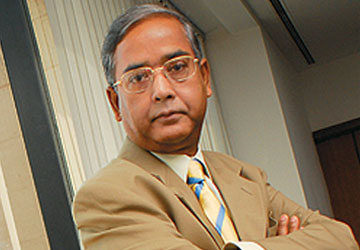 Sucheta Dalal (ML): The situation today is that money is gushing out of mutual funds since August when loads were scrapped.
Sucheta Dalal (ML): The situation today is that money is gushing out of mutual funds since August when loads were scrapped.
ML: You have made the point that there is no level playing field and this decision was taken without ensuring that it applied across the financial sector. Are mutual funds making a representation to SEBI or to the finance ministry to correct the situation?
UKS: The mutual fund industry through AMFI (Association of Mutual Funds in
ML: Wouldn't you agree with that? After all, the new pension scheme, which is excellent, has no takers in the private sector because nobody has an incentive to sell it. It is proved again in the mutual fund industry and even the insurance sector would have been destroyed if commissions were reduced to zero. Wouldn't you agree that there must be a cap on commissions rather than no commission?
UKS: I won't agree with the statement that Mr Swarup didn't understand the insurance industry; he was a veteran in the financial sector for over three decades. He was coming from the standpoint that if a particular yardstick is applied in the name of customers/investors then the same should apply across the financial sector and he was right in that thinking.
ML: Agreed. But understanding that there has to be an incentive to sell, is key to financial products, isn't it?
ML: When you were in the finance ministry (as joint secretary, Capital Markets Division) the discussion used to be about getting retail investors to invest through mutual funds. Today, the lack of recognition that even mutual fund investors need advice has created a situation where they are staying away. The number of retail investors is also shrinking. Doesn't this reflect badly on our aspiration to be seen as an economic super power? Doesn't the market look very hollow?
UKS: Two things—my understanding is that the business is shifting to insurance industry related products because of the high commission and incentive that a seller of insurance products is getting. He is hence pushing the product whether or not it is in the interest of the investor. This is leading to very large sales in that sector.
Secondly, when we talk about the market as a whole and look at where the money is going, it is important to notice that people have options or alternative investment avenues. A majority of the people are going for traditional, government-owned instruments such as fixed deposits with PSU banks and post office savings. This is happening because these products are available easily and are simple to understand. The net result is that the investor population is shrinking. A McKinsey report had predicted that there would be two immediate outcomes of the no-load policy—one is that penetration of mutual funds into smaller towns—Tier 2, 3 and 4—will be discouraged and smaller IFAs (independent financial advisors) would go out of business and only some high net-worth investors or those who are technically savvy in big cities would continue to buy these products. Other than that, the industry itself will see big players getting bigger while smaller players will find it difficult to survive as operating margins shrink. — Sucheta Dalal
(Read the full interview in Moneylife magazine's forthcoming issue).